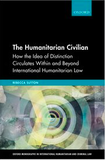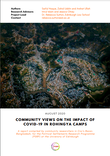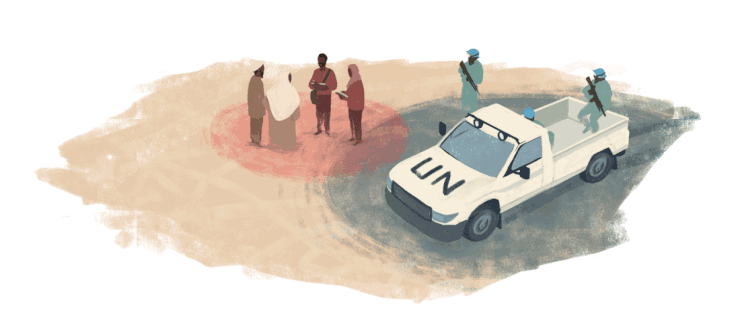RESEARCH & WRITING
My scholarly agenda focuses on the everyday life of international humanitarian law, civil-military interactions, and the emotions and perceptions of frontline actors. My writing has been published in peer-reviewed journals, in edited collections by Oxford University Press (OUP), Cambridge University Press (CUP), and Routledge, and in popular venues such as The Conversation and International Law Grrls. My research has been funded by the Pierre Elliot Trudeau Foundation, the Social Science and Humanities Research Council of Canada, the European Research Council, the Australian Research Council, and the Leverhulme Trust.
Recent Projects

Book Project: OUP Monograph on the Humanitarian Civilian
My first monograph was published with Oxford University Press in February 2021. It explores the identity and legal status of international humanitarian actors, examining the way in which humanitarian actors perform their civilian status in relation to other international actors on a daily basis in armed conflict settings and in training spaces. This monograph is based on my doctoral project from the London School of Economics, which involved qualitative empirical research in South Sudan and at civil-military training spaces. The book argues that international humanitarian actors self-conceptualize as a special kind of civilian actor, which I term the 'civilian plus'. This leads them to enact distinctions not only from combatants but also from those who would be categorized as civilians under international law.
The Humanitarian Civilian is available here
Book Launch May 5 2021 (12:30-2 pm BST virtual): Info here
My first monograph was published with Oxford University Press in February 2021. It explores the identity and legal status of international humanitarian actors, examining the way in which humanitarian actors perform their civilian status in relation to other international actors on a daily basis in armed conflict settings and in training spaces. This monograph is based on my doctoral project from the London School of Economics, which involved qualitative empirical research in South Sudan and at civil-military training spaces. The book argues that international humanitarian actors self-conceptualize as a special kind of civilian actor, which I term the 'civilian plus'. This leads them to enact distinctions not only from combatants but also from those who would be categorized as civilians under international law.
The Humanitarian Civilian is available here
Book Launch May 5 2021 (12:30-2 pm BST virtual): Info here
Leverhulme Trust Project: 'Frontline Land: The Everyday Life of International Humanitarian Law (IHL)'
From January 2020-December 2021 I engaged in a Leverhulme Trust Early Career Fellowship project at Edinburgh Law School. This project uncovers IHL's human component, exploring the emotional life and perceptional judgements of those who are expected to enact law in war. The first strand of the project examines the interplay of law and emotions in humanitarian negotiations, and the second strand explores the role of individual and collective emotions in IHL pedagogy. The Leverhulme project further includes an innovative pedagogical component, which involves partnering with practitioner organizations to develop bespoke legal trainings for frontline practitioners. I continue to work on these themes currently, now based at the University of Glasgow.
From January 2020-December 2021 I engaged in a Leverhulme Trust Early Career Fellowship project at Edinburgh Law School. This project uncovers IHL's human component, exploring the emotional life and perceptional judgements of those who are expected to enact law in war. The first strand of the project examines the interplay of law and emotions in humanitarian negotiations, and the second strand explores the role of individual and collective emotions in IHL pedagogy. The Leverhulme project further includes an innovative pedagogical component, which involves partnering with practitioner organizations to develop bespoke legal trainings for frontline practitioners. I continue to work on these themes currently, now based at the University of Glasgow.

Youth 'Participatory Action Research' in Conflict and Displacement Settings
This project explores the emancipatory possibilities and potential pitfalls of conducting 'participatory action research' (PAR) with young people and adults who are affected by armed conflict or displacement. I traveled to Cox’s Bazar, Bangladesh, in July 2019 to carry out knowledge exchange activities in the Rohingya camps. One of the trainings I facilitated was a PAR training for members of Rohingya Youth for Legal Action, a camp-based youth organization that advocates for youth rights in the camps. The main goal of this training was to equip youth with basic research skills so that they can effectively gather and report on community views about issues that matter to them. In 2020, I began working with a team of three local researchers to explore the impact of Covid-19 in the camps.
The most recent reports of the Rohingya-led research teams are available here (Rohingya Community Views of Covid-19); and here ("Like Birds in Cages: Community Definitions and Concepts of Home, Rights, Justice and Citizenship in Rohingya Camps).
This project explores the emancipatory possibilities and potential pitfalls of conducting 'participatory action research' (PAR) with young people and adults who are affected by armed conflict or displacement. I traveled to Cox’s Bazar, Bangladesh, in July 2019 to carry out knowledge exchange activities in the Rohingya camps. One of the trainings I facilitated was a PAR training for members of Rohingya Youth for Legal Action, a camp-based youth organization that advocates for youth rights in the camps. The main goal of this training was to equip youth with basic research skills so that they can effectively gather and report on community views about issues that matter to them. In 2020, I began working with a team of three local researchers to explore the impact of Covid-19 in the camps.
The most recent reports of the Rohingya-led research teams are available here (Rohingya Community Views of Covid-19); and here ("Like Birds in Cages: Community Definitions and Concepts of Home, Rights, Justice and Citizenship in Rohingya Camps).






